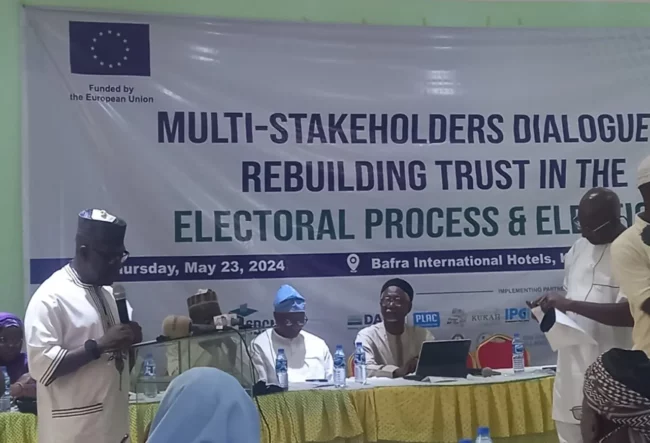Stakeholders who converged in a one-day dialogue in Kaduna on building trust in citizens against future elections have identified rigging, vote buying and selling, manipulation of results, go-to-court syndrome, and mobilisation of thugs, among others, as factors that make Nigerians lose trust or interest in elections.
This was the position of participants at the end of the one-day interaction organised by the International Press Centre (IPC)with the support of the European Union and held at the Bafra Hotel recently.
The interaction saw participants from the media, political parties, women, youths, security agencies, INEC officials, civil society, etc. harp on the need to build trust in citizens against future elections because citizens are gradually losing interest in elections.
Dr Abubakar Saddique Mohammed of the Centre for Democratic Development Research and Training, Zaria, who was the chairman of the dialogue, noted that this one-day dialogue is important in view of the fact that the next election is not too far.
He asserted that the act of rigging in past elections has caused Nigerians to lose trust in the ability of the Electoral Management Board (EMB) to hold free and credible elections, especially in the area of transmitting results.
“Years after military rule, one would think that civilians and political leaders have learned their lesson, but sadly, that is not the case, and the mistakes of past elections are repeated over and over again.”
He stressed that every institution, organisation, party, and even citizen are guilty of electoral practices, especially in the area of vote buying and selling, adding that, unless the political actors are willing to play by the rules, there will be no free and fair election.
“We are very lucky in Nigeria that it is no longer fashionable for the military to rule, and Nigerians are willing to resist, but we shouldn’t take that for granted; we should strive to maintain good election processes.”
“But we are lucky that the military has also learned their lesson that they don’t have the final solution to our problems, which are complex and not as straightforward as they thought in the past.
“INEC alone cannot conduct the elections. All over the world, it is not only the Electoral Management Body that conducts the elections. You have the bureaucracy, the CSOs, the political parties, and others, and what they do determines the outcome of an election, whether it is free or fair.”
“If you have political parties led by leaders who are determined to rig elections, there’s little that INEC can do. The weight we put on INEC is too much. Secondly, we believe that the judiciary can solve all problems, but this is not true. People rig elections and say, Go to court.”
“The result of it is that the Court has been politicised; they give all sorts of judgements that cannot stand the test of time.
“The only way to deal with the situation is to ensure that all those who participate in elections—INEC, political parties, leaders, the media, everyone—play a role. That way, we will have a free and fair election.”
The lead presenter, Professor Dung Pam Sha, argued in his presentation that unless trust is restored, the desired results of democracy and good governance cannot be achieved since voters will always fight election results.
According to him, Nigerians have witnessed a lot of problems and predicaments with the electoral system, and the roles played by many stakeholders in the process have created a situation where trust is dwindling.
He opined that “trust is key to democracy. If there’s a high level of trust, it will increase citizen participation, which will increase turnout in elections, leading to regime legitimacy, and we can then achieve stability in democracy.”
In his remarks, the Kaduna State Resident Election Commissioner of INEC, Mr Aminu Idris, who was ably represented by Mrs Rukaiyatu Sani Imam, pledged to build a framework that not only addresses the challenges faced in the past but also paves the way towards achieving a free, fair, and credible election for a stronger democracy in line with global best practices and a brighter future for the country.
Also speaking, Kaduna State Director of the National Orientation Agency (NOA), Alhaji Abubakar, appealed to Nigerians to change their attitudes towards the election by becoming honest, truthful, and sincere in their actions, as only then will the elections be free, fair, and credible.
ALSO READ THESE TOP STORIES FROM NIGERIAN TRIBUNE
